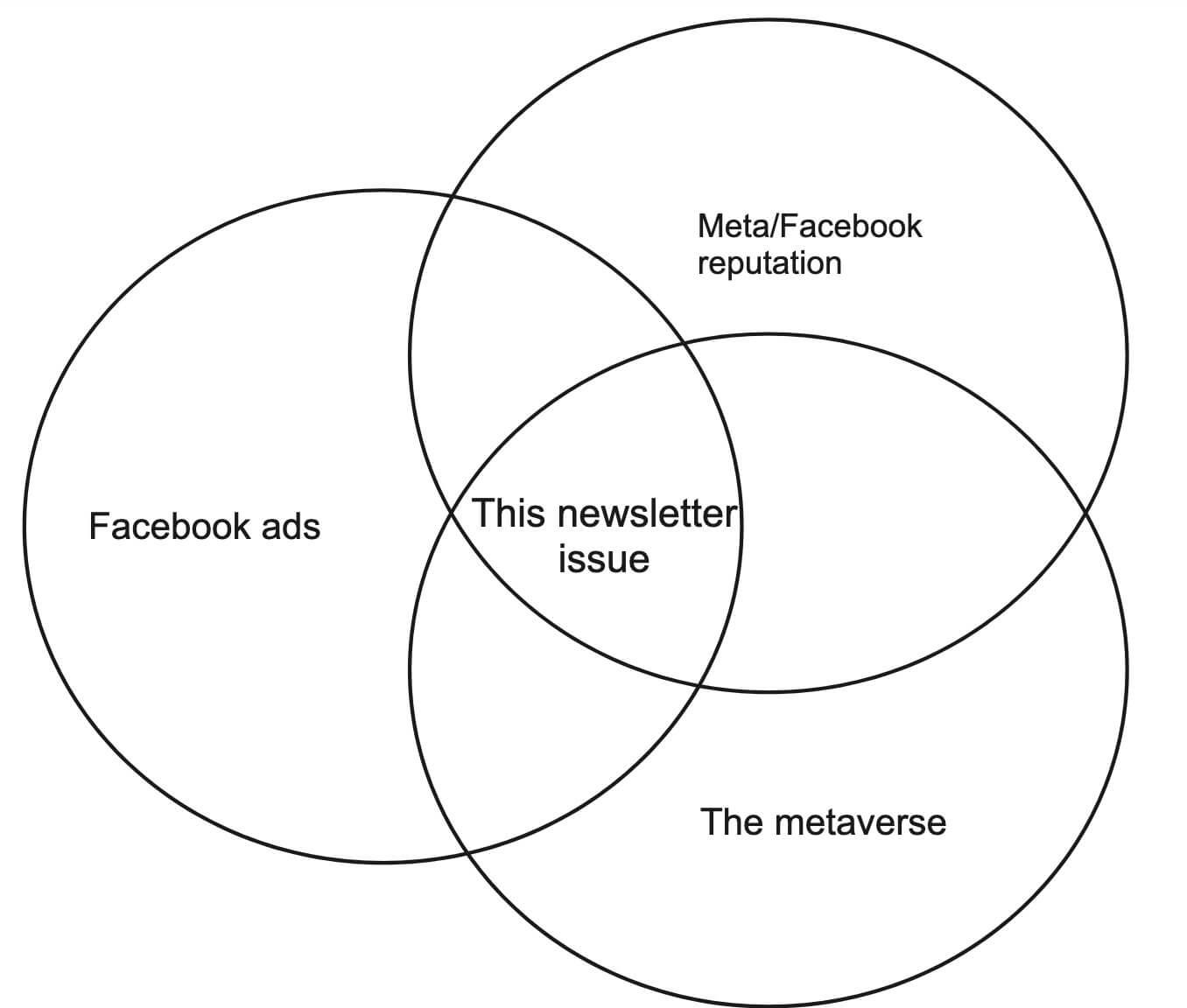We’ve all heard by now that “The Facebook Company” renamed to Meta. For the record, my opinion on the rebrand is that is really gives me health tech or wellness tech vibes rather than tech tech? Very Goop/Gweneth Paltrow to me.
But! Today’s issue isn’t directly about the Meta rebrand but more a number of things that revolve around it and make for an interesting Venn diagram.
I’m going to start with the reputation issue. With the current whistleblower case still ongoing, the criticisms of Facebook are at an all time high, and with the reveal that they were aware of the proliferation of misinformation and body image issues but decided those things were good for business it has prompted a pretty open conversation around Facebook and Instagram as platforms.
Ryan Gellert, the CEO of Patagonia wrote this post on LinkedIn saying they stopped advertising on Facebook in June 2020 and the current events are solidifying that that was the right decision to make for their business.
From the post:
The internal Facebook documents released over the last few weeks have made it incredibly clear that they know the irreparable damage that their lack of accountability causes their three billion users and the corrosive effects that has on society itself. Facebook’s leadership knows what steps it can take to mitigate such harm -- yet they have repeatedly failed to reform.
We believe Facebook has a responsibility to make sure its products do no harm, and until they do, Patagonia will continue to withhold our advertising.
Crossing over into the next circle, this article argues that performance advertising on Facebook and co is largely a scam.
With the number of times that platforms like Facebook and LinkedIn have had to “correct” their performance metrics, it’s not that hard to believe. My personal experience counters this, as Perkbox did get a lot of leads (that converted to sales) from Facebook, but even then we knew it was because we were an unestablished brand in a new market and Facebook’s reach was fast and cheap. The same tactic was used in the UK and very quickly become unviable to continue using as results lowered and prices increased.
With AI able to identify pretty much anything, the article argues that it is just identifying people who are already going to buy, serves them and ad and takes credit for putting the idea in their head to begin with.
From the post:
somewhere between 60-99%* of the people exposed to those ads would have purchased anyway
Related reading: The Long and the Short of It (PDF here) goes into long term brand building vs short term performance marketing
The end of the article gives some advice that “if you have the power to invest any percent of your digital ad spend in other, more serendipitous, hard-to-measure channels, take it” and I agree. Many times I’ve heard “we need to diversify our channels” but the suggestions were just different social media brands.
That’s not a different channel, it’s a different platform of the same channel.
Finally, we get to the metaverse.
My current role is with Willow, which makes digital twins which is actually part of the “metaverse” concept as it synchronises real world physical things with the internet. So I’ve been following all this metaverse stuff fairly closely and truly hate the Meta take on it. I don’t want my life to be synced to the internet. I do however see the benefits for things like IoT being connected to more stuff than we realise, and having the omnipresent cloud compute all those numbers into useful optimisations.
Smart cities, for one, are an incredible concept and very quickly becoming a reality because the way cities are now is not going to last very long. And it’s not about the surveilance state, but really mundane things like “are all the bins on the street overflowing and attracting aggressive birds and the garbage trucks are stuck in traffic and pedestrians are complaining it smells bad and one of them got swooped and is now bleeding from their head but the ambulance is also blocked in traffic”
Having an avatar is not of interest to me. Solving actual problems in the world is.
More related reading
The first link is a long read from Anne Helen Peterson about the Peloton universe and how there’s this whole connected and orchestrated plan of instructors’ friendships within Peloton, who got invited to a verrrryyyy micromanaged wedding, and so on, all devised to suck you in to the Peloton “family” and become a brand loyalist.
The topic might not be up your alley, but the concept of the Marvel Cinematic Universe applied to brands and real life, played out across Instagram and SaaS subscriptions is just a HUGE show of what’s possible with a heavy investment in long term brand planning.
Secondly (and lastly), an article about how Fortnite is a relevant and accurate portrayal of what the metaverse currently is. I’ve never played Fortnite and for the unenlightened like myself, apparently things that happen in real life (events, pop culture references) get referenced in-game and then fall out of fashion just like they do in real life. It also goes into digital twins if you want to learn more about them.
As always, would love to hear your thoughts on Meta.




